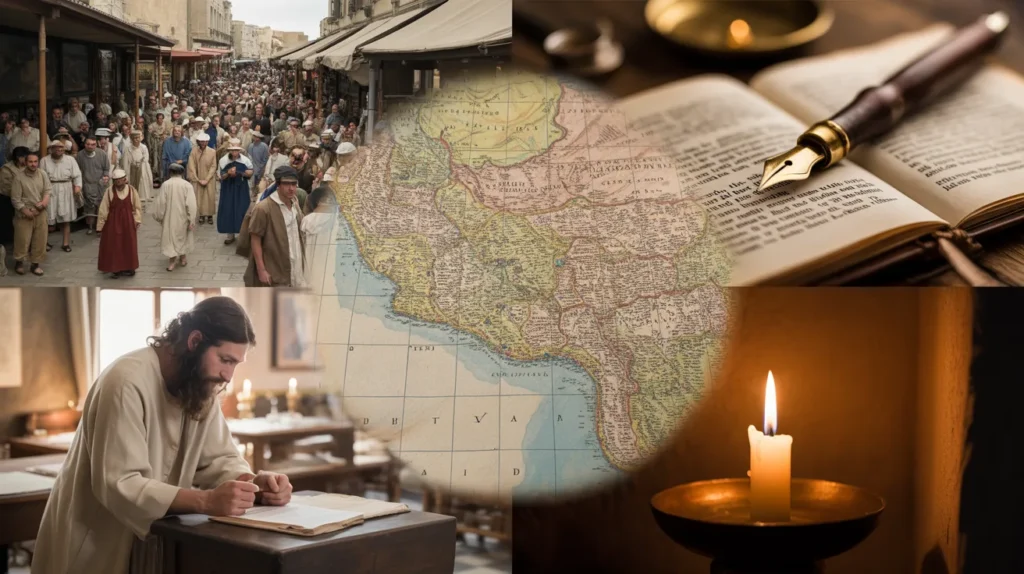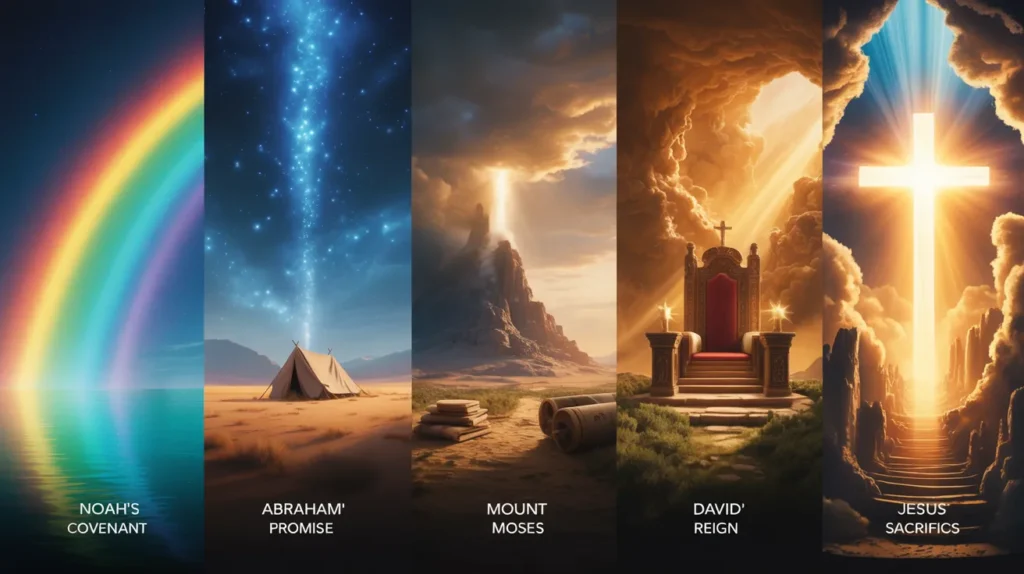Life can feel like a storm—chaotic, unpredictable, and overwhelming. In moments of doubt, we search for something unshakable, a truth that doesn’t fade. That’s where God’s Word steps in, offering an anchor when everything else feels uncertain.
John 1:1 reveals a powerful truth: “In the beginning was the Word.” This isn’t just poetry—it’s a declaration of divine order. The logos represents God’s wisdom, woven into creation itself. It’s the reason light breaks through darkness and hope rises from despair.
When anxiety whispers lies or confusion clouds your path, remember this: the Word remains. It doesn’t bend to chaos. It doesn’t fade with time. It stands firm, offering grace and purpose even when our own words fail.
Key Takeaways
- God’s Word provides stability in life’s storms.
- John 1:1 highlights the eternal nature of the logos.
- Divine wisdom is embedded in the universe.
- Faith anchors us when doubt creeps in.
- Grace meets us where human strength ends.
Introduction: When Words Fail, the Word Remains
Human advice runs out, but divine wisdom never does. Picture this: you’re pacing the hospital hallway, clutching test results that scream uncertainty. Friends offer well-meaning platitudes, but their words feel like bandaids on a wound that needs stitches.

That’s when *John 1:1-2* pierces the noise: “In the beginning was the Word, and the Word was with God.” Not a fleeting idea—Jesus, the eternal Word, existed before time. His truth isn’t swayed by panic or Google searches.
What if the answer to your chaos isn’t just another strategy, but a Person? The same Word who spoke galaxies into being is scripting your story with purpose. When human words crumble, His remain—unshaken, unstoppable, and utterly enough.
Understanding the Logos in the Bible: A Foundation of Faith
Ever felt like your thoughts spin faster than your prayers? The term *logos* isn’t just ancient Greek—it’s God’s answer to our chaos. More than a concept, it’s divine logic wrapped in flesh.
Divine Logic Meets Human Need
Greek philosophers debated the *logos* as impersonal reason. But *John 1:1* flips the script: “The Word was God.” Jesus isn’t a force—He’s a Person who speaks, creates, and walks with you.
Three game-changers in this verse:
- Eternality: “Was” implies He always existed—no beginning, no end.
- Fellowship: “With God” shows perfect relationship.
- Authority: As *logos*, His words shape galaxies and your next step.
Why This Truth Changes Today
Your to-do list won’t whisper peace. But the *logos* does. When decisions overwhelm:
- Pause. Breathe. Remember who holds time.
- Ask: “What would the *beginning word* say here?”
- Trust His logic over frantic planning.
He’s not just the answer—He’s the living God who walks with you through every question.
John 1:1-4 – The Logos as Creator and Life-Giver
Every sunrise whispers a secret—the same hands that painted the sky shaped your story. John 1:3 declares it plainly: “All things were made through Him.” Not some things. Not accidental things. All.
Verse Breakdown: “All Things Were Made Through Him”
Galaxies spin at His command. DNA coils with precision. The Logos isn’t a distant force—He’s the architect of everything. Break down John 1:3:
- Scope: “All things” includes quarks, quasars, and quiet moments.
- Method: “Through Him” means Jesus is the conduit of creation’s brilliance.
- Purpose: Nothing exists randomly. Your life is part of His masterpiece.
Real-World Application: Seeing Creation Through the Logos’ Eyes
What if folding laundry mirrored cosmic design? The Logos infused meaning into:
- Work: Your desk isn’t a cage—it’s a canvas.
- Relationships: Every hello carries eternal weight.
- Struggles: Even brokenness reflects His redemption plan.
Secular culture calls life a “happy accident.” The universe begs otherwise.
Encouragement: You Are Part of His Masterpiece
The hands that sculpted canyons cradle your grief. The voice that ignited stars calls you beloved. Remember:
“You’re not a cosmic afterthought—you’re the reason He went to the cross.”
Breathe deep. The same life-giving power that filled Eden’s rivers flows in you today.
The Logos Became Flesh: John 1:14 and the Gift of Presence
You’ve sat in waiting rooms, gripping test results, wishing someone truly understood. John 1:14 answers that ache: “The Word became flesh.” Not a distant deity—God wrapped in skin, stepping into your chaos.
The Incarnation: God’s Ultimate “I Understand”
Greek philosophy saw the *logos* as cold logic. But Jesus? He got blisters. Felt hunger. Wept at graves. The incarnation means:
- He validates your pain: “He was tempted in every way” (Hebrews 4:15).
- He shares your limits: Jesus napped in boats (Mark 4:38).
- He redeems your mess: His glory “dwelt among us”—literally, *pitched a tent* in our brokenness.
Application: How Jesus’ Humanity Meets Your Struggles
When the baby won’t sleep and your patience won’t either, remember: Jesus Christ once begged for rest (John 4:6). His fatigue sanctifies yours. His tears hallow yours. Loneliness? He was abandoned. Overwhelm? He sweat blood.
Prayer Prompt: Thanking Him for Drawing Near
Try this today: “Word-made-flesh, thank You for sitting in my dust. Not fixing from afar—but holding my hand. Teach me to trust Your nearness.”
The Logos as Light in Darkness: John 1:5
Some nights feel endless, with shadows stretching longer than your strength. Yet John 1:5 declares: “The light shines in the darkness, and the darkness has not overcome it.” This isn’t wishful thinking—it’s a cosmic reality.
Biblical Context: Light vs. Darkness in Scripture
From Genesis 1:3 (“Let there be light”) to Revelation 22:5 (“No more night”), Scripture frames light as God’s first word and final answer. Darkness symbolizes chaos, but the Logos is unconquerable.
Today’s Darkness: Anxiety, Fear, and the Logos’ Victory
News cycles scream doom. Inbox notifications trigger panic. But John 1:5 whispers: “Darkness has not overcome.” One woman battling depression told me, “Psalm 119:105 became my flashlight—His word guided my next step.”
His light outshines diagnoses. It pierces divorce papers. It silences doubt’s taunts. Name one dark place—invite the Logos to shine there today.
Encouragement: His Light Still Shines in Your Story
You aren’t forgotten. The same power that split the Red Sea parts your overwhelm.
“Hold on. Dawn is His specialty.”
Logos vs. Greek Philosophy: Why Jesus Is Different
Greek philosophy offered logic, but Christ offered love. Stoics saw the *logos* as an impersonal force—a cosmic principle guiding the universe. Yet *John 1:12* shatters that idea: “To all who received Him, He gave the power to become children of God.” The biblical Logos isn’t a cold concept. He’s a Person who calls you family.
Impersonal Force or Personal Savior?
Ancient thinkers like Heraclitus used the term *logos* to describe universal reason. But Jesus? He wept at graves. He touched lepers. He cooked breakfast for friends. The difference is stark:
- Stoic *logos*: Distant, unfeeling, like gravity’s rules.
- Biblical Logos: Hands scarred by nails, whispering your name.
This isn’t abstract philosophy. It’s the reality of a God who bends low.
How This Truth Changes Your Prayer Life
Praying to a force feels like shouting into the void. Praying to a Father changes everything. Try this shift:
- From “Fix my problems” to “Hold my heart.”
- From “Why?” to “Abba, I trust You.”
“You’re not serving a principle—you’re loved by a Person.”
His power isn’t in formulas. It’s in the nail-pierced hands that lift your chin.
The Logos in Your Everyday Moments
Morning routines often start with scrolling—what if they began with Scripture? The *Logos* isn’t confined to ancient texts. It’s alive, ready to transform your commute, coffee breaks, and chaotic afternoons.
Practical Ways to Invite the Word Into Your Routine
Replace autopilot habits with eternal impact. Try these steps:
- Scripture before screens: Open the Bible app before social media.
- Breath prayers: Whisper “Your Word sustains me” during stress.
- Verse sticky notes: Place Psalm 33:6 on your fridge or dashboard.
“By the Word of the Lord the heavens were made.” —Psalm 33:6
Scripture Meditation: Psalm 33:6 and the Word’s Power
This verse isn’t poetry—it’s a reminder. The same *term* that crafted galaxies speaks to your grief. Meditate on it:
- Read aloud slowly. Let each syllable sink in.
- Ask: “What is God creating in my chaos today?”
- Thank Him for His *wisdom* in your story.
Challenge: Swap one worry for one verse this week. Watch His words recalibrate chaos into peace.
When the Logos Feels Distant: Holding Onto Truth
Silence can feel louder than unanswered prayers. Seasons come when Scripture seems flat and worship feels hollow. Yet history proves God often works most powerfully when He seems most absent.
Biblical Examples of God’s Silent Presence
Elijah heard no earthquake in the cave—just a whisper (1 Kings 19:12). Moses saw a burning bush after 40 silent years (Exodus 3:2). Both discovered: divine timing redeems human waiting.
Corrie ten Boom clung to Psalm 34:8 in Ravensbrück’s horror. She later testified: “God’s light shone brightest when all other lights went out.” Your prison walls don’t limit His reach.
Affirmations to Cling To When Faith Wavers
- The Logos spoke light—He’ll speak to your darkness.
- Your feelings don’t define His nearness.
- Delays aren’t denials. Abraham’s wait birthed nations.
“What seems like God’s absence is often His preparation.”
Try this prayer today: “Word, even when I don’t feel You, I trust Your way is perfect. Sustain me like You did Elijah—one day at a time.”
Conclusion: Living as Women of the Word
Grace meets us where words fall short. The *logos* isn’t just a concept—it’s Christ, active in our chaos. He shaped galaxies, walks beside us, and conquers every shadow.
You’re a living letter of His love (2 Corinthians 3:3). Carry His truth into your world. Serve fiercely. Love boldly. Let joy defy circumstances.
Remember: you’re not just reading Scripture—you’re reflecting it. The same *power* that raised the Son pulses in your daily steps.
Prayer: “Jesus, make my life an echo of Your eternal ‘Yes.’ Write Your story through me.”
FAQ
What does “Logos” mean in the Bible?
In John 1:1, “Logos” refers to Jesus Christ as the divine Word—God’s expression of truth, wisdom, and creative power. It goes beyond language, embodying God’s nature and purpose.
Why is John 1:1 important for Christians?
This verse reveals Jesus as eternal, fully God, and active in creation. It anchors faith in His deity and His role in shaping reality, offering assurance of His authority.
How does the Logos impact daily life?
Recognizing Jesus as the Word transforms perspective—He brings light to confusion, purpose to chaos, and intimacy with God through His incarnation (John 1:14).
What’s the difference between Greek philosophy and the biblical Logos?
Greek thinkers saw “logos” as an impersonal principle. The Bible presents Jesus as a personal Savior who speaks, loves, and enters human suffering (John 1:14).
How can I experience the Logos in everyday moments?
Engage Scripture prayerfully, watch for God’s creativity in nature, and rely on Jesus’ presence in trials. Psalm 33:6 reminds us His Word sustains all things.
What if God feels silent despite the Logos’ promises?
Biblical figures like David (Psalm 13) and Job show faith thrives even in silence. Cling to truths like John 1:5—light always overcomes darkness.



